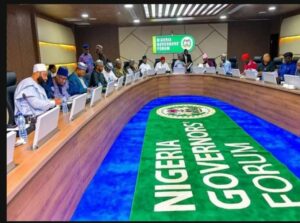August 3, 2024

In response to President Bola Tinubu’s signing of the N70,000 Minimum Wage Law, some state governors have set up implementation committees on the new pay while others have resolved to wait for the Nigeria Governors Forum (NGF’s) position, some said they could pay without embarking on retrenchment.
The committee comprises representatives from the state government, the labour centres, and the organised private sector.
It is chaired by the Head of Service and co-chaired by the commissioner for finance, while the director (Establishment and Pension) is the secretary.
Other members of the committee are the commissioners for budget and planning, works and transport, local government and chieftaincy affairs, and Communications; the senior adviser and counsellor to the governor; the permanent secretaries (Finance, Service Welfare, Justice); and the senior special assistant to the governor on labour matters.
Apart from the federal controller on labour and employment, the sector is represented on the committee by the chairman of the Nigeria Labour Congress, the chairman of the Trade Union Congress (TUC), the chairman of the Joint Negotiation Council (JNC), the chairman of COHESU, and the secretary of the JNC.
For instance, in Kwara State, Governor AbdulRahman AbdulRazaq has approved the constitution of a tripartite committee to work out the consequential adjustment component for other categories of workers.
The Kwara Chamber of Commerce (KWACCIMA), the Manufacturers Association of Nigeria (MAN), and the Nigerian Association of Small and Medium Enterprises represent the private sector.
On the cost implications of implementing the new minimum wage, a top government official said, “We need to wait for the report of the tripartite committee set up by the governor to know the details of what it will cost the government to implement the new minimum wage for its workers.”
In Plateau State, the commissioner for information and communication, Hon. Musa Ashoms, said that those who know the state’s financial status are seriously examining the situation to ascertain whether the State government will be able to pay the new minimum wage.
He said, “If we can pay or there is contrary reason, the state government will engage the general public or civil servants to inform them about it.
He also disclosed that the state government is not considering retrenchment, adding, ‘’As it stands today, it is currently conducting recruitment exercises in government-owned tertiary institutions and MDAs.
The Imo State government says it is willing to pay the N70,000, according to the commissioner for information, Hon. Declan Emelumba.
He said they had established a mechanism to shore up funds for implementing the new minimum wage.
Emelumba highlighted that as a responsible and responsive government, they don’t intend to retrench workers but rather motivate them for optimal productivity.
The Zamfara State government says the adoption of a new minimum wage can only be decided after a meeting of the state governors.
The director-general of media and communications in Government House, Gusau Malam Nuhu Salihu Anka, said, Zamfara recently adopted and signed into law the N30,000 minimum wage and started payment in June.
“The decision of whether to adopt the N70,000 minimum wage for the respective states in the country can be revealed only after the governors’ meeting, which is expected to be held soon,” he said.
Governor Nasir Idris has said that Kebbi State is still waiting for a response from the Nigeria Governors’ Forum on implementing the new wage.
He assured workers in the state that he is ready to implement whatever the federal government decides.
However, if the new wage of N70,000 is implemented, the state may have to request additional federal subvention to meet the desired demand.
Ekiti State government has expressed readiness to pay the new wage.
The information commissioner, Hon. Taiwo Olatunbosun, who stated this in Ado Ekiti, said Governor Biodun Oyebanji, would not disappoint Ekiti workers on the issue of the new wage.
“I believe the governors at the Federal Economic Council (FEC) and at the Nigeria Governors’ Forum (NGF) are discussing various issues, and I am very sure that having more resources will be one of those things they will be discussing. But Ekiti is working towards having more resources, and it won’t be a bad situation to have more of them.”
He said the state government would not retrench workers because of the new minimum wage.
Taraba State Governor Agbu Kefas said he is ready to pay any salary the federal government settles on for civil servants.
“I am ready to pay whatever minimum wage bill the federal government signs into law for civil servants. Kefas stated.
The Rivers state governor, Sim Fubara, had even before the arrival at N70,000 minimum wage and the signing into law by president Tinubu, assured the civil servants that the state is ready to pay whatever amount reached between the organised labour and the federal government.
Governor God Obaseki, had in already in May 2024 during the inauguration of the Labour House in Benin City, announced the increase of the minimum wage for workers in the state from N40,000 to N70,000, to reflect the current economic realities in the country.




